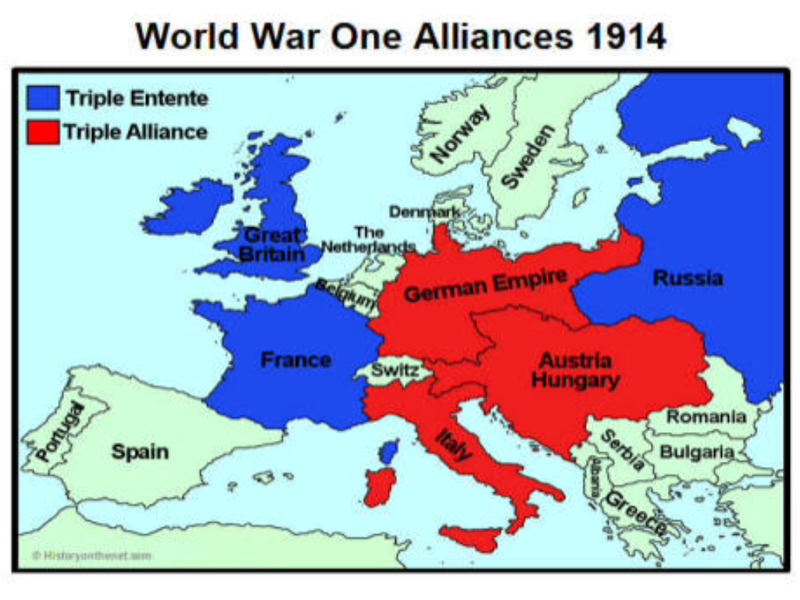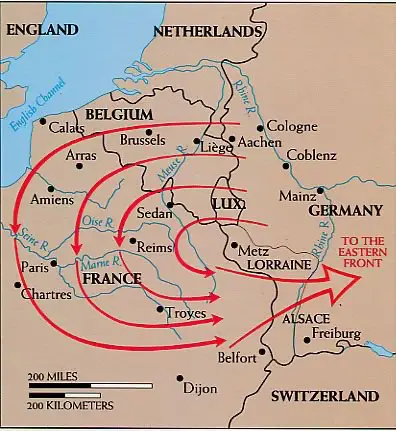World War 1
1/24
There's no tags or description
Looks like no tags are added yet.
Name | Mastery | Learn | Test | Matching | Spaced | Call with Kai |
|---|
No analytics yet
Send a link to your students to track their progress
25 Terms
Industrial Revolution
A period of rapid industrial growth and technological advancement that began in the late 18th century, leading to significant changes in manufacturing, transportation, and society, which contributed to the conditions of World War I.
Peace in Europe (before 1914) - Industrial revolution and advanced technology
-Hundreds of peace organizations had formed and many efforts were undertaken in Europe to outlaw war completely
-Many believed that progress and industrialization had made war obsolete or a thing of the past
When was the Lusitania sunk?
-The Lusitania was sunk on May 7, 1915 off the coast of Ireland by a German U-boat.
-Ship was found to be carrying 173 tons of war munitions for Britain
-killed 1,200 people including 128 Americans
July crisis + DATES
June 28 - Archduke and Sophie Assassinated
July 5 - Germany Issues Blank Check Assurance
July 23 - Austria issues ultimatum to Serbia
July 25 - Serbia agrees to all demands but one
July 28 - Austria rejects offer and declares war on Serbia
July 30 - Russia Mobilizes to borders
July 31 - Germany demands Russia stand down
Aug 1 - Germany declares war on Russia
Aug 3 - Germany declares war on France
Aug 4 - Great Britain declares war on Germany
Day that U.S. declared war on Germany
- On April 6, 1917, the House endorses the declaration of war 373-56 and by the end of June the first American troops land in France.
- This happened because Germany kept sinking U.S. ships, and although the U.S. claimed to be neutral, they favored Britain and assisted them much more than Germany
Peace in Europe - Peace movements and Alliances
While many imperialist nations were scrambling for territory across the globe, major changes are happening in Europe
The Franco-Prussian War and its impact
was a conflict between France and Germany from 1870 to 1871 that resulted in the unification of Germany and significant territorial losses for France, because Napoleon the third convinced the military that they could defeat the Prussians. Germany defeated France.
Why did the alliances lead to war?
-rising militarism - nobody wanted to be the weakest
-imperialism - close calls for war
nationalism ‘we are better than you are’
Ottoman Empire + The Balkans
At its height in the 15th century, the empire encompassed most of Southeast Europe, and the Ottomans had invaded Austria and Vienna.
A series of wars with Russia, Austria and Poland in the 17th and 18th centuries severely weakened the empire.
Internal and ethnic conflict led to further weakening which by the 19th Century the Ottoman Empire was referred to as the “sick man of Europe”
The Balkan Wars (1912-1913) removed all remaining European territory - These two wars led to the term “The Powder Keg” of Europe
German Empire
-German Empire was founded from the aftermath of the Franco-Prussian war
-In 7 years, Prussia defeated Denmark, Austria, and France
-After these victories, Prussia joined with 4 other states to form the German Empire on Jan 18, 1871
Black Hand Union
-A secret nationalist society formed in 1901
-Didn’t want Austrian rule in Bosnia
-Wanted to liberate and unite Serbians
Black Check assurance
-Austria blamed Serbia for assassination
-Germany (Kaiser Wilhelm) offered A-H full support, so they could do whatever they wanted to Serbia
-This leads to Austrian Ultimatum
A-H ultimatum and Serbia’s response
-July 23, 1914, following the effects of the black check assurance, Austria gives mean ultimatum to Serbia
demanded…
-no more anti-Austrian activity
-serbia had to allow austrain officials into country for investigating
-needed reperations
-give austria fill access to serbia govt materials
-response needed in 2 days
serbian response
Accepted:
-Suppressing anti-Austrian propaganda within Serbia
-stopping nationalist movements ex. (black hand)
Rejected:
-Letting Austria take over investigating the murder of Archduke. Violated constitutional rules.
-July 28th 1914 Austria rejects Serbia’s offer and declares war against Serbia
Understand and explain the chain of events that led to fighting
Why did the Europeans think it would be a short war?
-Europeans have finished wars quickly in the past; never been a worry: military overconfidence
-Shlieffen plan was working, earning them rapid victories
-Underestimated modern warfare’s defensive power (trench warfare)
The formation of the Allies and the Central powers
By 1914 -
The Triple Entente (Allied powers during the war)
Great Britain
France
Russia
AND
The Triple Alliance (Also known as the Central Powers during the war)
Austria Hungary
Germany
Italy
A-H announced war on Serbia, these alliances went into action

The Schlieffen Plan and the major battles of the war
-Plan made by german General Alfred Graf Von Schlieffen for if germany was ever in a two front war
-created in response to France and Russian alliance
-Plan took advantage of Russia’s invredibly outdated infrastructure
lightning attack on French as they were more mobile
wipe out slow russians
-French had troops on german border
-Belgium did not let germans through, so germany attacked belgium because it was their way to get to the french

Key elements that defined the war including emerging technology and Trench warfare
Machine Guns
Poison Gas
Airplanes
Armored tanks
Mobile and larger artillery
Submarines
Barbed Wire and mines
The Monroe Doctrine and Roosevelt Corollary
American Neutrality, Trade and Freedom of the seas
Unrestricted Submarine warfare
Zimmerman Telegram
sent from Arthur Zimmerman From germany to mexico
-Intercepted by British 1917
The Romanov, Provisional and Soviet governments
Armistice and the treaty of Brest-Litovsk - implications and effects